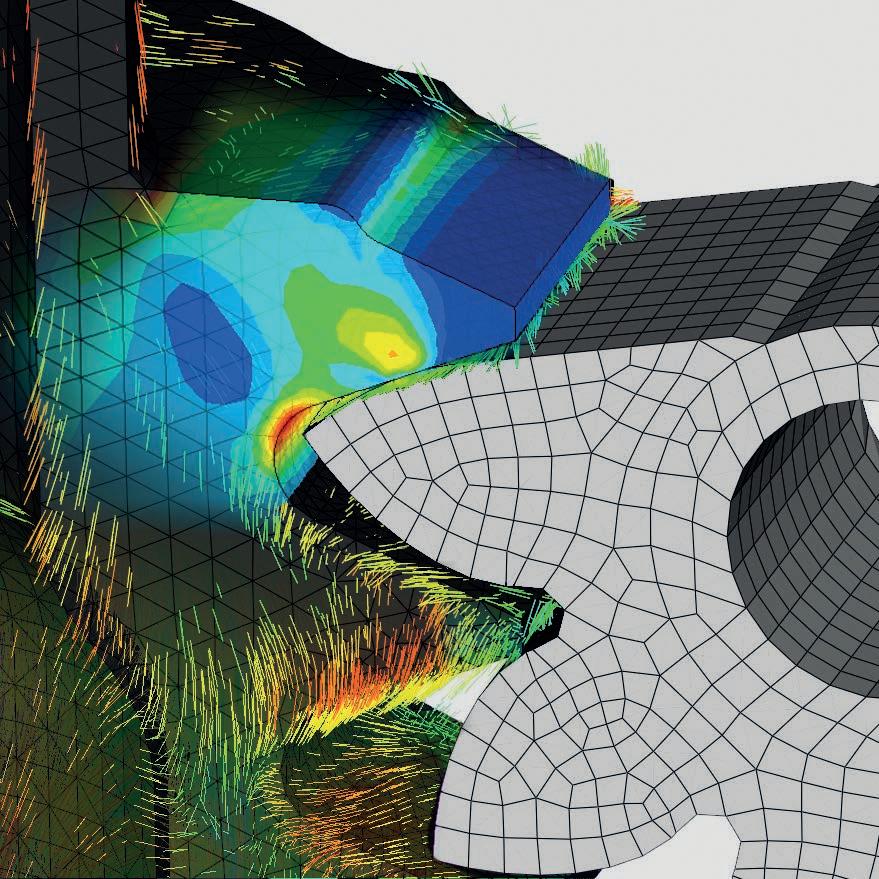
Simulate. Collaborate. Innovate. engineering


Simulate. Collaborate. Innovate. engineering
Customized technical support fuelling the success of innovative projects, including metal replacement, realized using our broad range of engineering materials.
This is what RadiciGroup High Performance Polymers can offer customers, thanks to its state-of-the-art computer-aided engineering (CAE) virtual simulation tools and the experience of its technical specialists.
Designing with engineering polymer materials to achieve demanding performance, lightweighting and sustainability targets becomes much more accessible, timely and costeffective by using reliable computer-aided simulation tools for the prediction of processing behaviour as well as real-world capabilities.
For studying the complex behaviour of fibre-reinforced composite materials, an advanced material modelling approach is crucial to make accurate predictions using integrated simulation technology, which couples the
process-induced properties (such as fibre orientation, weld line location, etc.) with the macroscopic material behaviour.
RadiciGroup High Performance Polymers Engineering Service makes all this available for customers and partners by performing in-house studies to support the development of challenging applications involving our special thermoplastic compounds. Moreover, our service provides access to reliable simulation data and material cards for the most widespread software tools on the market.
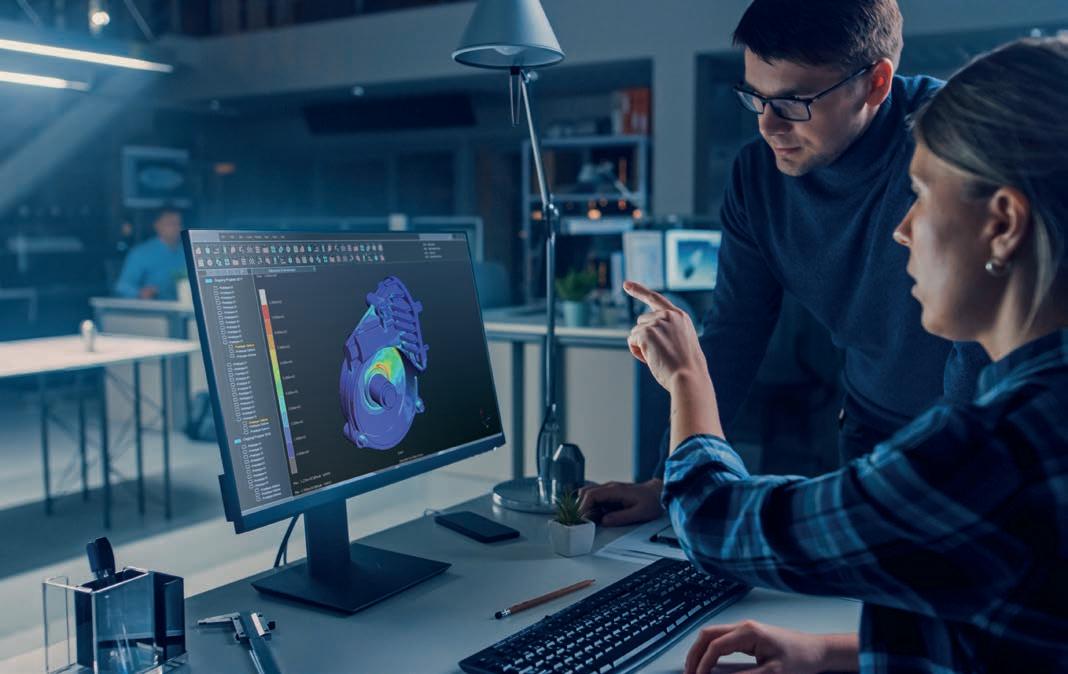
• Defining objectives
• Modelling
• Setting up inputs
• Solving equations with state-of-the-art advanced FEA and CAE tools
• Complete specialized technical support along the entire CAE workflow process.
• Selection of the best model, method and software to obtain the right answers to the questions coming from our customers’ product development teams.
• Plotting and interpreting results
• Reporting and follow-up
• Support for innovation challenges and metal replacement project workflows, including preliminary comparative cost analysis
• Follow-up with shape optimization, co-design, and transition to the prototype phase.
A professional support such as the one provided by the Group, making use of advanced CAE tools, can deliver many benefits for the development of demanding projects:
•
•
Minimizing trial and error and the use of physical prototypes, thanks to reliable CAE simulations. Detecting and correcting any feasibility obstacles in virtual environment, when the cost of making changes is still relatively low.
Performing an accurate material selection, choosing the best grade in our outstanding product range to meet the project requirements.
Relying on updated, precise and specific material data to perform technical calculations and simulations internally.
Implementing ecodesign principles, on the path to creating more sustainable products together with our costumers.
Keeping costs under control, exploring and comparing alternative solutions to choose the best option.
Troubleshooting unexpected issues during prototyping or early production stages.
A whole set of simulations for all your needs.
• Use of the most well-known CAE tools on the market for simulating injection moulding and related technologies.
• Predicting the filling, packing and cooling behaviour and estimating moulding warpage.
• Assessing optimal process parameters, suggesting injection type and locations, predicting process-related defects, etc.
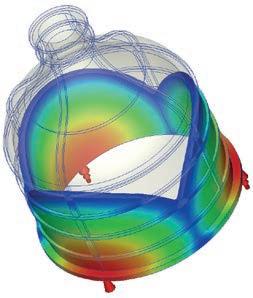
• Making use of cutting-edge software modules to closely reproduce the viscoelastic material response, crystallization rate, fibre-flow interactions, core-shift effects on inserts, and more.
• Simulation of other processes, such as 3D printing and extrusion, is under investigation.
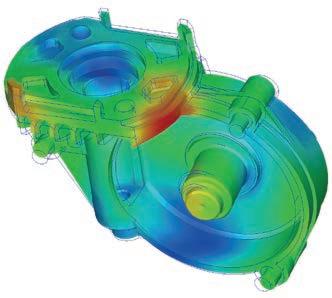
• Evaluation of static stiffness and strength evaluation of parts against design and abuse loads
• Non-linear structural simulation and multi-body contact modelling to simulate small assemblies.
• Modal and harmonic analysis to assess frequency response to vibrations
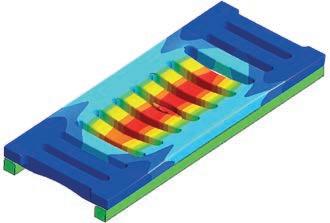
• Modelling of high-speed impact and crash phenomena can be modelled with implicit and explicit FEM codes, keeping in consideration the strain rate dependency of material properties.
• Thermal and thermo-mechanical effects on the model’s structural behaviour can be considered.

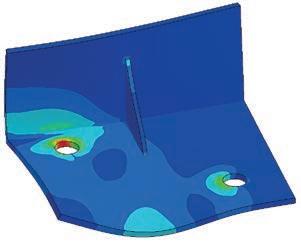
• Integrated simulation can take into account material anisotropy, induced by glass-fibre orientation during injection moulding or by local TPC reinforcement.
• Weld line locations, residual stress, warpage effects can be considered as well.

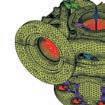

Injection simulation: warpage, GF orientation, weld lines...
FEA model: loads, boundaries
• These advantages are made possible by multiscale material modelling technology, supported by specialized software.
• An integrated analysis provides higher accuracy and reliability, thanks to a more in-depth understanding of material characteristics, and thus reduces overengineering and the need for prototype testing.

Multi-scale material modelling
• Thermoplastic materials show peculiar phenomena that are important to consider for improving performance in the long run.
• Subjecting materials to cyclic loading for a great number of cycles results in fatigue damage, which may lead to premature failure.
• The constant application of a steady stress for a long time can cause materials to “flow”, changing their apparent stiffness and ultimately, possibly, causing them to fail – this is the creep phenomenon.

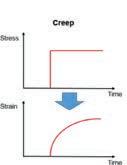
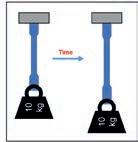
Integrated structural simulation
• The exposure of thermoplastics to heat or chemical substances for a prolonged time (ageing) may damage or otherwise affect their properties, changing their response to external loads.
• Our CAE software and procedures provide us with specific workflows and tools to deal with these kinds of aspects and accurately predict the long-term capabilities of a part.


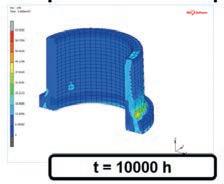

Tensile properties at various T, RH
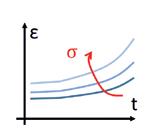
Creep properties Strain vs time
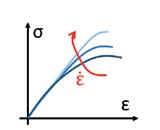
High speed tensile properties at various strain rates
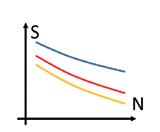
Fatigue properties Wöhler S-N curves
• Reverse-engineering and advanced material modelling for the Digimat® platform internally performed.
• Use of micro-computed tomography to inspect and validate fibre-orientation predictions with extreme accuracy.
• Material cards checked and validated independently, with comparison of FEM and testing on standard specimens or demonstrator parts.
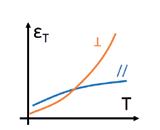
CLTE
Longitudinal and transvere
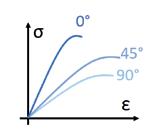
Anisotropic Multi-scale material models
Process simulation Comprehensive material cards ... and more! Based on specific needs of each project
• Many of the mechanical and physical data necessary to simulate material performance are organized in internal data management systems and available from our technical support team.
• Specific on-demand characterizations can be requested by customers for dedicated collaboration projects and applications.
Integrated structural simulation Real part validation


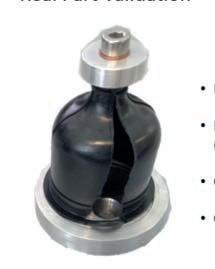
• Burst pressure
• Pulsating pressure (fatigue)
• Creep
• Others

The microstructure of the specimens used for anisotropic material calibration is inspected using advanced micro-computed tomography (µCT) techniques.
drive improvements in sustainability and ecodesign. Here’s how.
About 80%* of product-related environmental impacts are determined during the design phase.
Ecodesign is a methodology that guides the designer in considering the ecological impact of products during their developmental phase.
A set of technical tools and rules are available for designers, which should be complemented with material selection expertise, design know-how and CAE skills to become really effective.
Lightweighting - achievable through the redesign, rethinking and optimization of products - can lead to significant environmental benefits, especially in the automotive and transportation sectors.
EU Commission - EU Science Hub - Sustainable Product Policy 23/4/2020
Recyclability is facilitated by following the principles of Design For Disassembly, which make the recovery of end-of-life products easier and more affordable.
Sustainable materials, such as RadiciGroup’s portfolio of recycled or bio-based thermoplastic compounds, can be successfully employed in technical applications, by a careful and detailed evaluation of material performance and variability in computeraided simulations.
Certified, third-party verified, LCA and EPD® system data are available for all RadiciGroup engineering polymers to assess the real and measurable environmental performance of the different solutions.
RadiciGroup High Performance Polymers Engineering Service is the ideal solution for countless applications in all those sectors where creativity, high performance and flexibility are required. It has countless applications in:
RadiciGroup High Performance Polymers Engineering Service is available to our customers and strategic partners, in support of demanding projects made with our engineering thermoplastics. Our understanding of materials science and competence in accurately predicting real-world performance really makes a difference
Get in touch with your local RadiciGroup Sales Representative to learn more about the opportunity for us to collaborate on your projects through our Engineering Service.
RadiciGroup is among the world leaders in the manufacture of chemical intermediates, polyamide polymers and high-performance engineering polymers, including recycled and bio-based solutions. RadiciGroup products are the result of our outstanding chemical expertise and vertically integrated polyamide production chain and have been developed for use in a variety of industries, such as automotive, electrical and electronics, consumer and industrial goods, water management, transportation, household appliances and sport. At the core of the Group’s strategy is our strong focus on innovation, quality and customer satisfaction – always in alignment with our ESG principles.
Every day at RadiciGroup, we work to make circularity our business model. We optimize the use of materials while fine-tuning our processes, designing out waste and promoting recyclability from the earliest product design phases. We are always looking for low-impact solutions in terms of natural resources and energy. We rely on certified management systems for Quality, Health and Safety, Environment and Energy to keep our companies in line with the highest sustainability standards. Since 2004, the Group has released its Sustainability Report every year.
RADICI NOVACIPS SpA (Headquarters) Via Bedeschi, 20 - IT - 24040 Chignolo d’Isola (BG)
Tel. +39 035 4991311 - Fax +39 035 4994386 www.radicigroup.com info.plastics@radicigroup.com The information provided in this document corresponds to our knowledge on the subject as of the
The
if
combination with
material or additive, or in any process, unless otherwise expressly indicated. The data provided should not be used to establish specification limits. Such data are not intended to substitute for any testing you may need to conduct to determine the suitability of a specific material for particular purposes. Since the above-mentioned companies cannot anticipate all the variations occurring in end-use conditions, the above-mentioned companies make no warranties and assume no liability in connection with any use of the above information. Nothing in this publication is to be considered as a licence to operate under, or a recommendation to infringe, any patent rights. All images contained in this document are the property of their respective owners. Unauthorized use or reproduction of these images is prohibited.